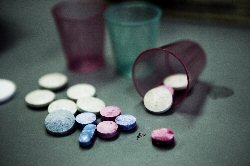New medicinal products with no undesired side-effects
A significant number of promising medicinal products must be discarded late in their development process because we know too little about the molecular mechanisms. The Danish Technological Institute heads an innovation consortium striving to solve the problems of undesirable side-effects of medicinal products.
The active substances in medicinal products for treating serious, life-threatening diseases like cancer are often small, organic molecules or peptide-like substances. These kinds of medicinal products often achieve their effect by interacting with specific proteins - or targets - in cells. Today, biological, cell-based screening methods are applied to identify potential medicinal substances.
An essential, generic problem in developing medicinal products is that most of the identified active substances interact with several protein targets. As a result, the medicinal product interacts not only with the protein target that triggers a preventive or curative effect, but also with a range of secondary protein targets. This causes a number of undesirable effects, thus rendering the substance unsuitable as a medicinal product.
By knowing what protein targets for medicinal products are in the pipeline, we can develop and optimise their chemical structures and thus manipulate their ability to bind to and interact with their protein targets. This process will also remove undesirable toxic effects without weakening the curative effect of the substances.
A general problem in developing new and more effective medicinal products is the difficulty or impossibility of generating knowledge on cellular protein targets and the mechanism of molecular effect with today’s technology. The innovation consortium therefore aims to develop new protein-chemical methods to enable the pharmaceutical industry to develop new medicinal products faster and with fewer undesirable effects. The consortium partners are the University of Southern Denmark, the Danish Technological Institute and a number of Danish pharmaceuticals.
